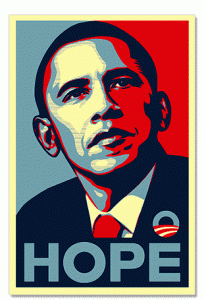Let’s see. Eighteen months ago President Obama’s public approval ratings are through the roof. Today, not so much.
What happened?
Others have written about policy, the economy, and the politics of it all. I wonder about how all that can be viewed from the perspective of brand. So I combed through the files and pulled up a structure from our friends at Leo Burnette.
 Burnette’s brand structure is simple. There are three components: brand personality, brand promise, and brand essence. The brand personality is the part that helps a person ‘relate’ to the brand. That is, it is what led to those hideous questions in focus groups like, “if Dove soap were a famous person, what type of famous person would that be?”
Burnette’s brand structure is simple. There are three components: brand personality, brand promise, and brand essence. The brand personality is the part that helps a person ‘relate’ to the brand. That is, it is what led to those hideous questions in focus groups like, “if Dove soap were a famous person, what type of famous person would that be?”
Then there’s the brand promise. The brand promise is the value statement. Ir addresses the specific thing that the brand will do for you. It is the ‘what is in it for me’ part of the brand. Most often this is captured in the tagline. I buy a BMW and I get the ultimate driving machine. I buy Panasonic and I am one a step ahead. I drink a Coke and get the real thing.
And yes. Most brands don’t actually keep their promises.
Finally there is brand essence. That is the emotional thing. It is the Disney magic. It is the Nieman Marcus return policy. The service at a Ritz Carlton. The reliability of a Honda. This is the hardest one to pull off because it is supposed what people ‘feel’ when they interact with the brand.
Let’s apply them to brand Obama. First, the brand promise. It is a good place to start because, by definition, a political figure’s brand promise is not going to appeal to everyone. It is the reason we have Republicans and Democrats. Delivering on his brand promise — which President Obama reminds people that he is doing — is not just something people won’t relate to (a common problem among package and service brands) but is something that Republicans will hate.
Now let’s go to the brand personality. Seems that the Obama brand personality seems to be rubbing Democrats the wrong way. What once was the everyman presidency is now being seen by many liberal Democratic activists as effete, elitist, and arrogant.
Which leave us with the brand essence. The emotional element. And there the brand Obama has serious competitive and circumstantial challenges. It is hard to keep excitement about “hope” when employment flirts with double digits and every morning you click on the Dow Jones to see if your retirement fund is still there. (Not that any President can do much about it …)
My read is that it is the brand personality that has suffered most and is the key to brand Obama’s revival. The President can’t change who he is – a Democrat – and therefore the promise is set. Nor can the President do much to change the macro picture of two wars and an economy that daily veers drunkenly on the knife’s edge of a cataclysmic abyss.
But by most people’s read, there is work to be done on how people relate to him as a person. The personality of his brand that was built on a certain populism. An appeal to a ‘higher calling’. It wasn’t divisive or bitter. It was both reasonable and aspirational.
Not an easy thing to do when folks are calling into question just about everything in your life — from where you were born to your faith.

